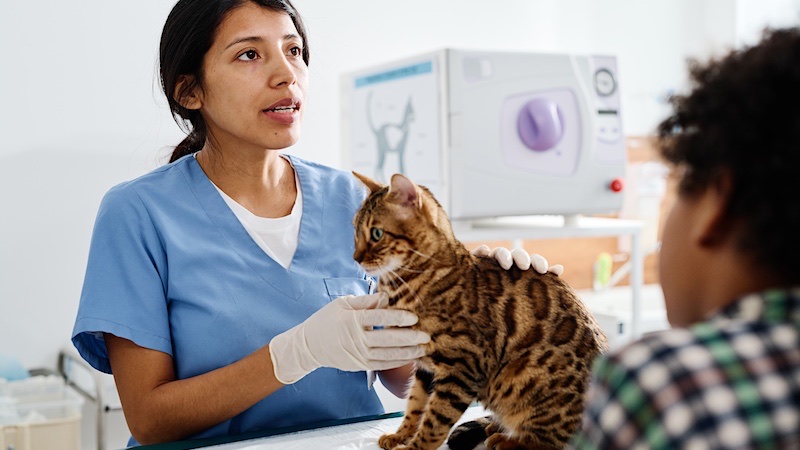Taking on a new cat or dog from an animal rescue group can be both an exhilarating and fulfilling journey, yet it may likewise present difficulties. There are several reasons why you may be denied for pet adoption, such as unsuitable home, inability to care for the new dog or cat properly or an unsatisfactory interview.
Veterinary advice and unrealistic expectations from the adopter can also play a role in denying pet adoption applications. To increase your chances of a successful adoption application of a new cat or dog from a rescue shelter, it’s important to understand these common reasons for denying pet adoption so that you’re well prepared when applying.
Unsuitable Home

Some households may not be suitable for pet adoption, owing to a variety of factors such as inadequate floor space or an absence of necessary balcony or garden fencing. Before submitting your adoption application and receiving a home visit, it is important to make sure that your property meets all necessary requirements.
When prepping your home for either a cat or dog, one of the primary factors to think about is space. Ensuring that your new family member has enough room to roam and play without feeling confined is essential.
Additionally, if you have current indoor cats or dogs and plan on keeping multiple animals in the same area, it’s important to make sure there is enough space for them all to coexist peacefully and comfortably.
Another important factor when considering whether or not your home is suitable for a pet is a fenced yard or cattery that can keep them contained within designated areas safely and securely.
A pet proof fenced yard also helps prevent unwanted visitors from entering your property uninvited such as feral cats or stray dogs which could pose health risks to both you, your family and pets alike if allowed onto the premises unchecked.
In conclusion, when considering taking in a new family member it is important to assess if your home environment is suitable for them. Furthermore, assessing one’s ability and willingness to provide proper care should be taken into consideration before applying.
Recap: When welcoming a new cat or dog, it is essential to guarantee that your property has both enough room and suitable fencing. A fenced in yard will ensure pets living in the household are protected from potential health risks posed by uninvited visitors like stray cats or dogs.
Ultimately, taking these steps will help make sure everyone can live happily ever after under one roof and improve your chances of a successful adoption application.
Inability to Care for the Pet
The ability to provide proper care is also essential for a successful adoption application. If you are unable or unwilling to commit to caring for an animal, then you really shouldn’t be visiting animal shelters and rescue groups. Some of these cats and dogs have suffered animal abuse and it takes both time and patience to build trust. If you are at work all day this would prove almost impossible.
As well as a lack of spare time, financial struggles and as already discussed, a cramped living space can all be obstacles to providing proper care for a cat or dog.
Financial burdens can make taking on a rescue cat (or dog) an improbable or impossible venture for some. As well as the adoption fee, veterinary bills can add up quickly and even indoor cats need shots every year. Food costs for them can also become expensive over time.
It’s important that you consider your budget before making any decisions about bringing in another mouth to feed. Additionally, if there are other pets in the household already they will need additional resources like toys and bedding which could further strain finances.
We must be consistent in the daily attention our pets require for them to stay healthy, both physically and mentally. This could range from ensuring they are fed twice a day, taking your dog for regular daily walks or making sure you make some time each day to play with your cat.
If these tasks are neglected it can lead to feelings of loneliness and depression in your furry family member due to inadequate love and affection as well as unmet needs.
Recap: Bringing home a rescue cat or dog isn’t for everyone; you should take into account financial costs, space demands and the time dedication needed to properly care for an animal before taking on such responsibility. Unmet needs can lead to loneliness in an animal if proper care isn’t provided – so make sure you’re prepared.
Unsatisfactory Pre-Adoption Interviews
Interviewing is a significant step in the adoption application procedure. The purpose of this interview is to ensure that the pet and potential adopter are compatible. Unfortunately, these interviews can sometimes be unsuccessful.
Reasons why this may occur include lack of communication between yourself and the shelter staff, unrealistic expectations from either party, or inadequate preparation by yourself.
Before committing to an adoption application, research the pet’s needs and make sure you have all necessary documents ready such as proof of residence. During the interview, inquiring about any potential issues can help to ensure that all parties are comfortable with the decision.
During the interview, expect questions related to your lifestyle such as your working hours? How often will they get exercise? What type of diet will they have? Are there any other pets in your home?
You may be asked about your familiarity with the animal and if they have had any prior experience of pet ownership, in order to gauge your capability to give suitable care.
Questions regarding financial resources may also come up such as who will cover vet bills or other expenses associated with owning a pet like food and boarding costs when you go on vacation.
Taking these interviews seriously and being well-prepared for the questions that may come up are key to successful adoption applications.
Securing vet advice beforehand for advice is also critical for providing them with suitable care and be sure to mention you have done this at the interview as this will give the rescue shelter confidence that you are taking your responsibilities towards the new cat or dog seriously.
Recap: Before taking on a rescue pet, potential adopters should be sure to bring all necessary documents for the pre-adoption interview in order to avoid any issues that may lead to a denied application. During the interview mention that you have sought advice from your local vet and expect questions related to lifestyle, experience with animals, and financial resources.
Veterinary Advice

Getting advice from a vet is key when bringing home an adopted cat or dog; it’ll help guarantee that the choice you make will be beneficial for both of you and offer important info about how to care for them properly.
A vet will offer advice on the best way to integrate them into their new environment and how to provide care. they can also provides guidance on the best way to introduce them into their new home and how to care for them once they’re there.
You should also ask your vet about any warning signs when introducing cats if you already have an indoor cat. Moreover, a vet’s counsel can be useful in deciding if a certain breed is appropriate for your lifestyle, home and existing pets.
What Kind of Veterinary Advice Should be Sought Before Adopting a Pet?
A vet can give guidance on what breeds might be most suitable for different living conditions, such as those who have access to the outdoors compared with apartment dwellers. Additionally, if necessary they can provide a list of required vaccinations and other preventative measures prior to adoption.
Once adopted, regular vet visits should become part of routine maintenance for pets just like humans need regular check-ups at their doctor’s office. This allows veterinarians to monitor changes in behaviour over time and address any health concerns early on before they become more serious issues down the road.
Plus these visits provide opportunities for owners to learn more about caring for their pets such as proper nutrition guidelines or ways to reduce stress levels during grooming sessions etcetera.
Seeking counsel from a vet before procuring an animal is crucial, as it can ensure the creature gets appropriate care and access to medical services.
Recap: When adopting a rescue pet, it’s essential to seek veterinary advice to discuss potential health issues or behavioural problems and ensure the chosen breed is suitable for your lifestyle. Regular vet visits should become part of routine maintenance afterwards in order to monitor changes in behaviour and address any health concerns early on.
Unrealistic Expectations
Unrealistic expectations can lead to a denial when it comes to adopting rescue dogs and cats. Potential pet owners should be aware of the commitment required for a pet, and have realistic anticipations prior to assuming the duty.
Many individuals fail to grasp the effort and time involved in owning a pet, especially when it’s a large dog or an older cat and this can result in rejection of adoption. A potential cat or dog owner may be unaware of the amount of effort and resources necessary to adequately care for a pet, making them unprepared or unable to commit.
Additionally, a potential adopter should also consider any lifestyle changes that might need to be made in order accommodate their new furry friend such as making sure there is enough space in their home or ensuring that someone will be available during the day if they are away at work all day long.
What Are Some Common Unrealistic Expectations When It Comes To Pets?
People often expect pets to behave like humans and think this means they will never make messes or require training – but this simply isn’t true. Potential pet owners should take the time to explore the particular characteristics of their preferred breed or species, so they can be informed about what type of behavior may result.
Additionally, many people believe that once an animal has been adopted its personality won’t change – however, even after adopting an animal it’s possible for them to become more active or less social depending on environmental factors such as living situation or age.

Recap: Potential pet owners should be aware that taking on a furry friend requires an immense amount of responsibility and effort; unrealistic expectations can lead to denial of adoption. Potential pet owners should be sure to thoroughly investigate prior to taking on a furry companion, as the temperaments of animals can differ depending on their environment.
FAQ
Why is adopting a rescue dog so difficult?
Bringing home a rescue puppy or cat can be challenging for various reasons. Rescue groups can have demanding criteria for potential adopters to guarantee the pet will be in a secure and caring environment, such as vetting processes, home inspections, background checks for any history of animal cruelty, references from veterinarians or other pet owners, and evidence of financial stability.
Ultimately though it’s worth the effort as rescuing an animal can provide them with a second chance at life while also providing you with unconditional love and companionship.
Why can’t I adopt a dog in Massachusetts?
In Massachusetts, obtaining a canine companion is not an option due to the stringent regulations of animal control. The Animal Control Act necessitates that all canines have to be certified, immunized and fixed before they are adopted.
Furthermore, breeders must meet standards such as providing appropriate housing and medical care for their animals in order to comply with the state’s regulations. In order to protect both public safety and animal welfare, these regulations are strictly enforced by local authorities throughout the state of Massachusetts.
What are the disadvantages of adopting a pet?
Having a pet can be gratifying, yet it is essential to reflect on the possible drawbacks. Rescue pets require time and attention, including regular veterinary visits and grooming. They may also cause damage to furniture or other household items if not properly trained.
Additionally, owning an animal can be expensive due to food costs, toys and supplies, medical bills, as well as boarding fees when travelling without your pet.
Finally, there are legal responsibilities that come with ownership such as licensing requirements in some areas which must be followed for compliance. It’s essential to research all aspects of pet ownership before making the decision so you’re fully prepared for what lies ahead.
How do I decline a pet adoption?
If you work at a rescue shelter and need to decline a dog or cat adoption it is important to be firm and consistent. Start by explaining your reasons for turning down their adoption application in an honest but respectful manner.
Be clear and specific about why it would not be a good match, as well as any criteria or prerequisites you have for potential adopters.
If possible, provide resources such as referrals to other rescue groups that may better suit their needs. Lastly, thank them for their dog adoption application to your organization and wish them luck with their search elsewhere.
Generally speaking a rescue group will turn down no more than 1 in 10 adoption applications as most people are trying to do something kind by rescuing an animal. If your shelter is turning down more than 10% you may want to look at bringing in a consultant to look into the reasons as to why.
Conclusion
About 6.5 million dogs and cats enter animal shelters each year in the U.S. but less than half are adopted. Animal rescues groups want every person who walks through the door to take home a cat or dog so do not be put off from trying for a pet adoption.
Being a kind and caring person goes a long way. Just ensure that your home environment is suitable, you are able to provide adequate care, pass pre-adoption interviews satisfactorily, receive veterinary advice and have realistic expectations when it comes to owning a cat or any other animals from a rescue shelter and you will be fine.





